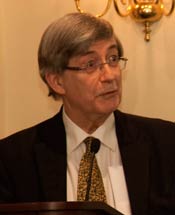Wald urges focus on chronic disease prevention
April 2010 | Volume 9, Issue 2

Photo by Jeff Gray
Epidemiologist Sir Nicholas Wald
explains the concept of the polypill,
a combination of statins, heart disease
and high blood pressure medications.
More attention should be devoted to preventing chronic diseases and less to measuring them, according to British scientist Sir Nicholas Wald. Best known for conceiving the polypill, an innovative and economical treatment that combines statins, heart disease and high blood pressure medications, Wald recently addressed a gathering of NIH researchers.
"Prevention is better than measurement; we are obsessed with measurement," he said. "It's better to lower blood pressure in all and measure it in some, rather than measure it in all and lower it in some."
Widely considered one of the world's leading epidemiologists and neonatal health experts, Wald's research on the polypill was hailed as the most important work published in 50 years by the British Medical Journal.
Wald and his colleagues have since been able to reduce blood pressure, LDL cholesterol and the risk of heart disease in polypill trials. Though there have been financial obstacles, two versions of the pill have been manufactured by the drug company Cipla: a pill designed for primary prevention and a secondary prevention pill containing aspirin.
The Disease Control Priorities Project identified the polypill concept as one of 10 "best buys" for advancing global health in low-resource countries. Wald said that preventive measures such as the polypill are even more important now that Western-style diets are contributing to cardiovascular disease in low-and-middle income countries.
Wald dismissed concerns that large-scale implementation of the polypill would "medicalize" people, instead likening it to birth control for women or malaria prophylaxis, neither of which requires the user to become a patient. Likewise, he downplayed the idea that the pill would encourage unhealthy behavior. "The well-informed and health conscious will be more likely to take it," he said.
Director of the Wolfson Institute of Preventive Medicine at University of London's Queen Mary college, Wald was knighted in 2008 for his accomplishments in the field of preventive medicine.
To view Adobe PDF files,
download current, free accessible plug-ins from Adobe's website.